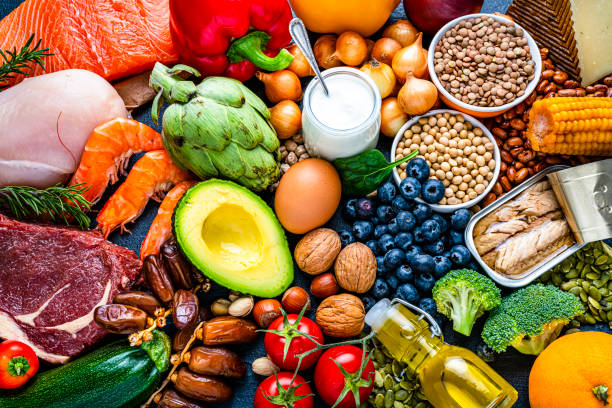Eating a balanced diet rich in healthy foods is essential for maintaining a healthy lifestyle. The right foods can support overall health, boost immunity, promote heart health, and help with weight management. Below, we explore some of the best nutritious foods to include in your diet for maximum benefits.
- Fruits and Vegetables for Vital Nutrients
Fruits and vegetables are packed with vitamins, minerals, antioxidants, and fiber, all of which are crucial for improving digestion and boosting your immune system. These healthy foods help reduce the risk of chronic diseases and are low in calories, making them a great choice for overall wellness.
Examples of healthy fruits and vegetables: Berries, apples, spinach, kale, carrots, and broccoli. Aim to eat a variety of colorful produce to maximize the health benefits.
- Whole Grains for Heart Health
Whole grains are an excellent source of fiber and essential nutrients that help regulate blood sugar levels and improve digestive health. Unlike refined grains, whole grains retain all their nutrients and are vital for heart health.
Examples of whole grains: Quinoa, brown rice, oats, and whole wheat bread. Incorporating whole grains into your diet can improve long-term health and help manage weight.
- Lean Proteins for Muscle Repair
Lean proteins are essential for building and repairing muscles and tissues. They provide high-quality protein without the unhealthy fats found in other protein sources. Lean proteins can support a healthy metabolism and help maintain muscle mass.
Examples of lean protein sources: Chicken breast, turkey, tofu, and fatty fish like salmon and trout. These foods are nutrient-dense and should be included in your meals for muscle support.
- Nuts and Seeds for Healthy Fats
Nuts and seeds are an excellent source of healthy fats, protein, and fiber, which are essential for heart health and weight management. These nutrient-packed snacks help keep you full for longer periods and provide sustained energy throughout the day.
Examples of nuts and seeds: Almonds, walnuts, chia seeds, and flaxseeds. A handful of these can provide a nutritious snack that supports long-term health.
- Legumes for Plant-Based Protein
Legumes are rich in plant-based protein and fiber, making them a great alternative to animal proteins. They help lower cholesterol, regulate blood sugar, and support overall health.
Examples of legumes: Lentils, chickpeas, and black beans. These versatile foods can be used in soups, stews, salads, and even baked goods.
- Healthy Fats for Brain and Heart Health
Incorporating healthy fats into your diet is important for brain function, heart health, and skin vitality. Unlike trans fats, these fats help regulate cholesterol levels and reduce inflammation in the body.
Examples of healthy fats: Avocados, olive oil, and fatty fish like sardines and mackerel. These fats are easy to include in your diet and promote overall health.
- Dairy or Dairy Alternatives for Strong Bones
Dairy products are rich in calcium, which supports bone health, and protein, which is essential for muscle repair. If you’re lactose intolerant or prefer plant-based options, dairy alternatives can provide similar nutritional benefits.
Examples of dairy or dairy alternatives: Greek yogurt, low-fat cheese, and plant-based milks like almond or soy milk. Choose fortified options to ensure adequate calcium intake.
- Water for Hydration and Detox
Water is often overlooked but is essential for overall health. Staying hydrated supports digestion, skin health, and helps detoxify the body. Drinking enough water can also boost your energy levels and improve mental clarity.
Tip: Aim for at least 8 glasses of water per day to stay hydrated and maintain optimal health.
Conclusion: Fuel Your Body with Healthy Foods for Long-Term Health
Incorporating a variety of these healthy foods into your daily meals provides balanced nutrition and supports a healthy lifestyle. Focus on nutrient-dense options like fruits, vegetables, whole grains, and lean proteins to improve your health, maintain energy, and reduce the risk of chronic conditions. By making these nutritious choices, you’ll ensure that your body gets the fuel it needs to function at its best.





